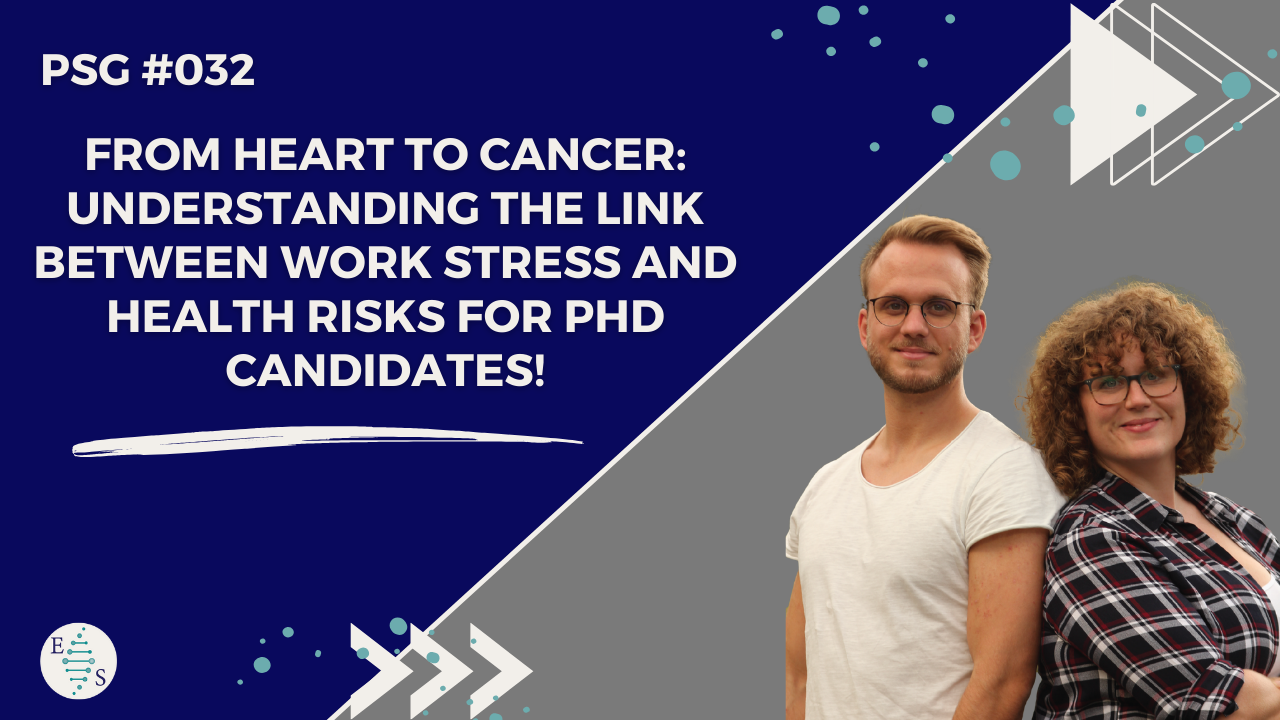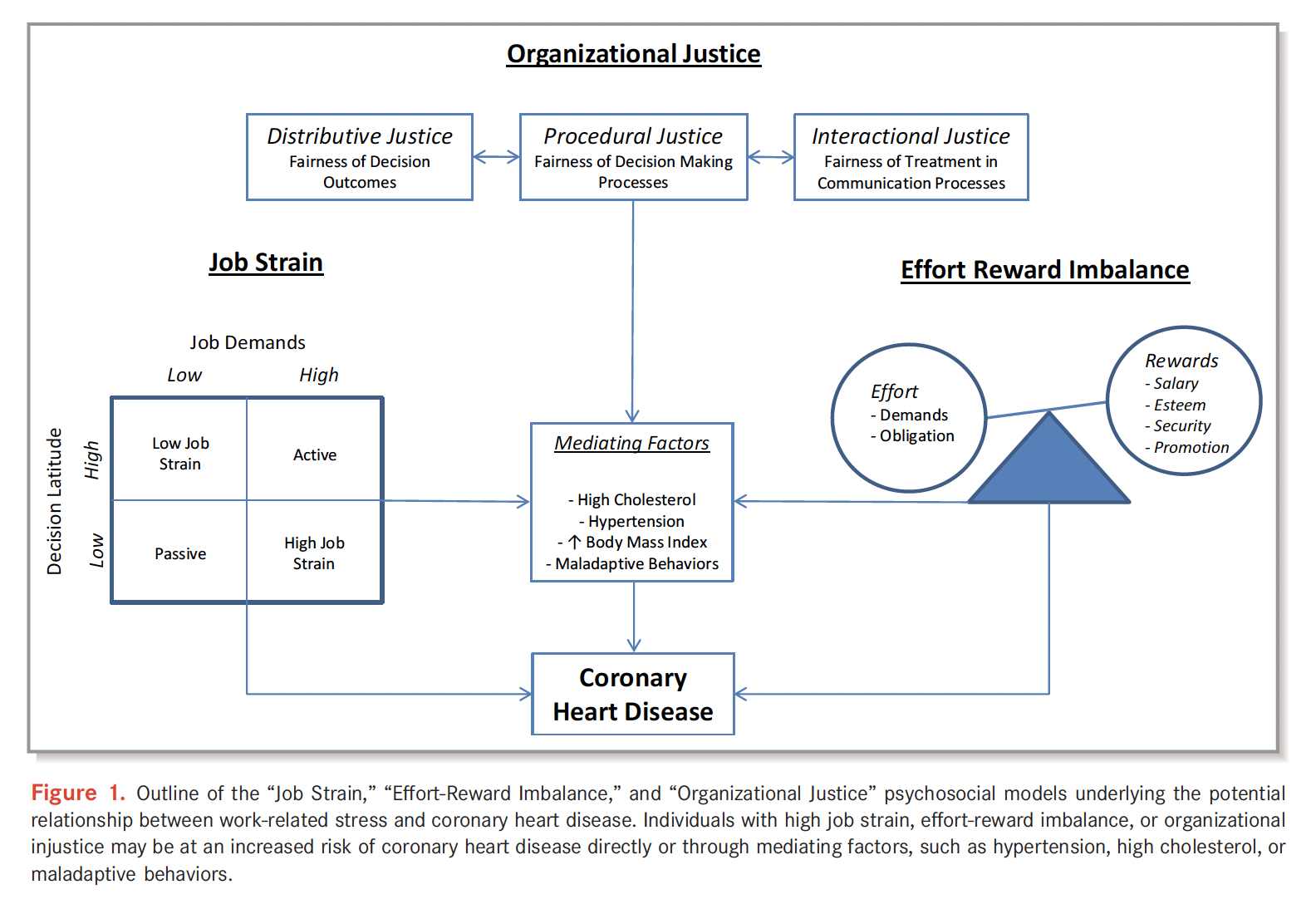
PSG #032: From Heart to Cancer: Understanding the Link Between Work Stress and Health Risks for PhD candidates!
Dec 03, 2023Welcome to a blog post that explores the link between work stress and health risks - from heart to cancer!
We'll dive into the science behind this connection and discuss ways to manage workplace stress. So please sit back, relax, and let’s get started!
1. Workplace stress
Let's talk about workplace stress and its potential impact on our health.
It's no secret that stress can take a toll on our physical and mental well-being, but did you know it could also increase the risk of developing cardiovascular disease and even cancer? That's right - the link between work stress and health risks is a serious issue that deserves our attention.
Workplace stress is something that most of us have experienced at some point in our careers. Whether it's a tight deadline, a difficult coworker, or a demanding boss, job-related stress can take a toll on both our physical and mental health.
And what about those PhD candidates? Are they at even higher risk levels? It's a possibility worth considering. You are working in a challenging and highly demanding environment. Often even toxic. Working long hours and neglecting rest and recharging is deemed normal.
So, what can we do to take control of our well-being at work?
Stay tuned for some tips and tricks on managing workplace stress and keeping our hearts (and bodies) healthy!
2. How Does Job-Related Stress Increase Risk for Cardiovascular Disease?
Jobs can be stressful. There's no denying that. A PhD can be especially tough and challenging.
And while we often think of stress as just a mental health issue, the truth is that job-related stress can have serious physical consequences. Studies have shown that high levels of workplace stress can increase your risk for several physical health problems, including cardiovascular disease and even cancer.
This is especially true for PhD candidates - those who:
- work long hours,
- have high-pressure jobs,
- or/and high workloads.
The link between workplace stress and heart health is a complex one, but one theory is that the constant release of stress hormones can cause inflammation in the body, leading to damage in the arteries.
This, in turn, can lead to an increased risk of heart attack and stroke. And if you're a PhD candidate, the risk may be even higher.
Studies have shown that individuals in demanding jobs, with little control over their work, are more likely to experience job-related stress and its negative consequences on their health.
In a study, they showed factors influencing your work stress as shown in their graph below.

The three major factors are:
- “Job Strain” - high demands in the job, endless to-do lists, pressure to publish, tight deadlines…
- “Effort-Reward Imbalance” - meaning you work your ass off but on the one hand nothing works out (e.g experiments keep failing) and on the other hand you get no external rewards like appreciation and respect from your boss, more salary (for poor PhD candidates anyway not possible) or security (also not possible as PhD candidates)
- “Organizational Justice” - Fairness in decision-making and outcome and in communication, is also often problematic in the academic environment.
These can negatively influence many different bodily functions related to coronary heart diseases like cholesterol, blood pressure, and body weight.
Another study went further into detail and found factors on a molecular level that are increased (Inflammation, pro-thrombosis, RAAS activation, Oxidation) or decreased (endothelial dysfunction) upon chronic stress.

This shows that as PhD candidates you have to take good care of yourself and keep an eye on your stress levels!
3. Can Workplace Stress Lead to Cancer Development?
Can workplace stress lead to cancer?
It's a question that has been bugging many of us who are constantly exposed to the pressures of work. The answer is not that simple, but studies show that job-related stress can indeed increase the risk of cancer development.
The underlying mechanism is still not clear, but it is believed that chronic stress can weaken the immune system, making it less capable of fighting cancer cells.
In addition, stress can also trigger inflammation, which has been linked to the development of cancer.
PhD candidates, in particular, may be at a higher risk level due to their increased exposure to stressors.
It's important to take control of your well-being at work by practicing stress-reducing techniques like meditation, exercise, and time management. It may seem like a daunting task, but a little effort can go a long way in safeguarding your health.
Remember, your health should always come first, even amid a demanding work schedule.
4. PhD Candidates - Do They Have Higher Risk Levels?
Let's talk about PhD candidates or what some people refer to as "high achievers."
These are the individuals who always go above and beyond, and exceed expectations.
But, do they have higher risk levels when it comes to work-related stress? The short answer is yes.
PhD candidates tend to have higher levels of job-related stress due to their intense workload, pressure to perform, and constant need to stay on top. This can harm their physical health, as stress hormones can increase the risk of cardiovascular disease and even cancer.
PhD candidates need to prioritize self-care and establish healthy coping mechanisms to manage work-related stress. This can include taking breaks throughout the day, practicing mindfulness or meditation, and setting realistic expectations for themselves. Remember, being a high achiever is great, but not at the cost of your health.
5. Tipps to reduce stress and increase work-life balance
It's no secret that stress can take a toll on your body. So what can you do to protect yourself?
It's important to take control of your well-being at work, whether that means
So, if you're feeling stressed out at work, it's important to take steps to reduce that stress and protect your physical health.
Whether it's:
- speaking up about your workload
- practicing stress-reducing techniques like meditation or exercise
- learn about mental health
- figure out your work-life balance
- be aware of burnout signs
- increase your resilience
- taking at least a short break,
- maybe even go for a walk,
- practicing mindfulness,
- or simply talking to a friend or colleague about your stress
there are plenty of things you can do to take control of your well-being at work.
So, don't let job-related stress take a toll on your physical health - take action today to protect yourself and stay healthy for years to come.
6. Conclusion – Taking Control of Your Wellbeing at Work
So, now that we know how workplace stress can affect our physical health, including the risk of cardiovascular disease and cancer, what can we do about it?
Especially for you as PhD candidate, it's important to take control of our well-being at work.
One key strategy is to establish boundaries between work and personal life, making sure we have time to truly unwind and relax.
Another is to prioritize self-care activities, such as exercise, healthy eating, and adequate sleep.
Additionally, seeking support from coworkers, managers, or mental health professionals can help us manage stress and prevent burnout.
Ultimately, taking control of our well-being at work requires a proactive approach and a willingness to prioritize our health.
So, let's commit to making our health a priority and taking the necessary steps to reduce workplace stress and protect our long-term health. After all, our health is our most important asset.
See you next week!
PhD survival guide is a free newsletter. Please support by sharing with those who may benefit from this post.
If you want more help:
We're excited to share the PhD Survival System with you because we know how tough it can be to get through a PhD program. We have developed a holistic system combining all the necessary areas to obtain optimal results.
We start with the foundation, your mindset, and on top of that we building two pillars with time management and stress management.
More about the PhD Survival System here:
Stay connected!
Join our newsletter to receive the latest posts!
Don't worry, your information will not be shared.
We hate SPAM. We will never sell your information, for any reason.